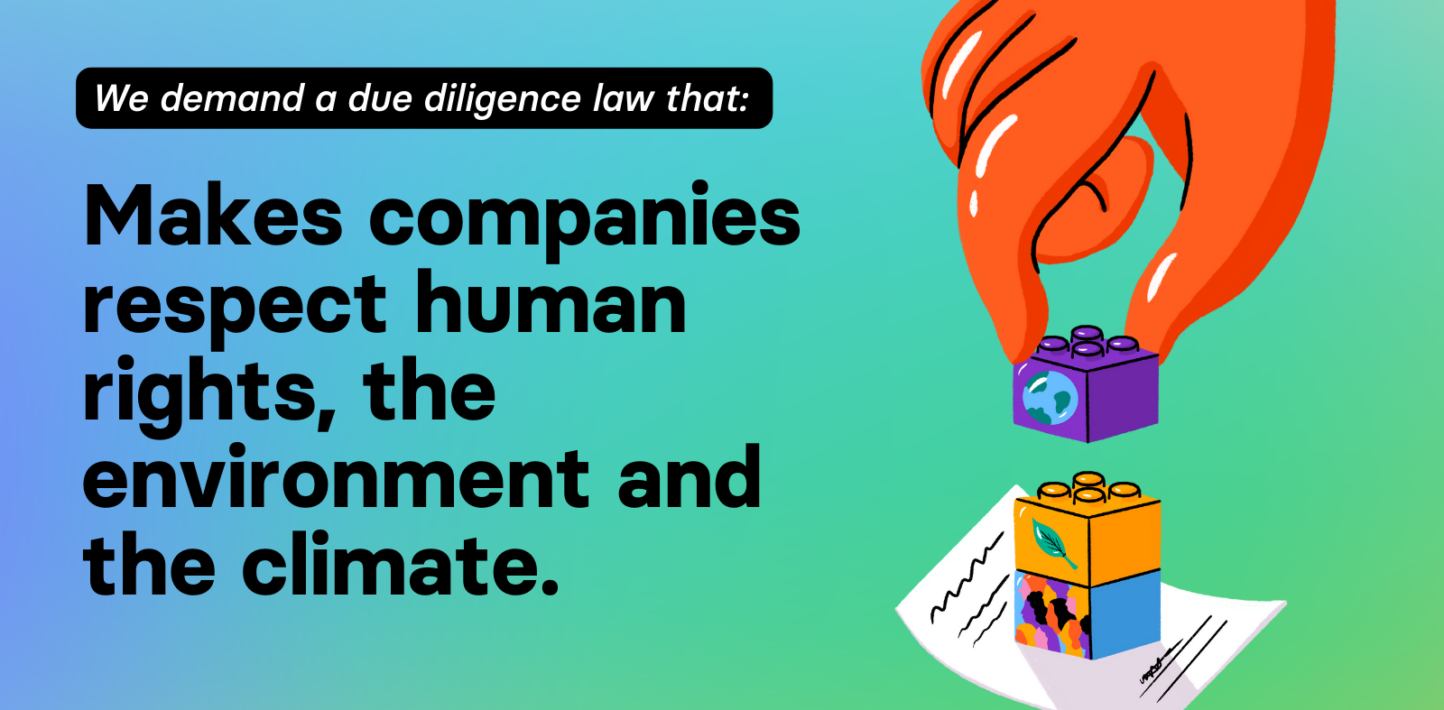Ahead of negotiations on a European corporate accountability law 15 organizations, including Amnesty International, issued an urgent appeal to EU Commissioner Reynders to fulfil his promise for an ambitious CSDDD including strong climate ambition, inclusion of the financial sector, strong measures on access to justice and full value chain coverage.
12 December 2023
Open Letter: Your Commitment to an Ambitious CSDDD
Dear Commissioner Reynders,
The EU is the largest trading bloc in the world. European companies operate everywhere and in every sector, from extractives to garments to finance. How they behave matters.
In April 2020, the European Commission committed to introducing a new law that could help bridge the gap between Europe’s vision for a sustainable future and existing business practices. As civil society representatives working on the Corporate Sustainability Due Diligence Directive (CSDDD), we are deeply concerned that the final agreement will fail to meet its stated ambition. We urge you to help fulfill your promise of EU rules that will advance the green transition and protect human rights.
In recent weeks, we have seen the Council drastically weaken the proposal on key elements. A strong civil liability framework, financial sector inclusion, meaningful climate action requirements, and full value chain scope are all essential components of an acceptable final agreement. In previous remarks, you have rightly signaled that we face a climate emergency and a sustainability crisis. We urge you to stay committed to addressing this crisis. We cannot afford to wait.
1. Strong mechanisms for civil liability are indispensable.
Restricting civil liability to a subset of harms will undermine the CSDDD’s ability to prevent and address corporate abuse. Victims must be able to go to court to protect their collective rights, which include the rights of workers, trade unions, and Indigenous Peoples. The Directive must also enable judicial claims to protect the environment.
Where harm occurs, those affected should obtain support in overcoming the barriers that prevent them from seeing justice in court. This includes greater evidence disclosure and reasonable time limitations for court cases, among others. Without these measures, claimants continue to have rights on paper but not in practice.
2. The financial sector must not be given a special exemption and must conduct due diligence.
This year, you explicitly stated that the financial sector should be captured by the Directive, and that the Commission’s objective was to cover all sectors. In 2022-2023, organisations ranging from corporations and industry representatives to civil society groups published close to 50 statements stressing the importance of financial sector inclusion in the CSDDD.
Financial actors possess nearly 80% of the private sector’s financial assets in the EU. Excluding them – and their activities, such as lending, insurance and reinsurance – prevents us from moving towards sustainable economies, and from encouraging responsible investment and financing practices. It is also inconsistent with international standards on business and human rights.
3. Climate action urgent, and companies must implement meaningful plans to tackle climate change.
At least 107 out of 425 of the world’s biggest fossil fuel extraction projects are operated by EU-based companies. With us on track to reach a disastrous 3ºC warming by 2050, the CSDDD must require companies to effectively implement strong transition plans with time-bound absolute emission targets for scope 1, 2 and 3 emissions, and refer to the Paris Agreement. The plans cannot be a formalistic exercise – companies should be held accountable for them.
4. Companies’ full value chains must be covered.
The text risks limiting the due diligence duty to exclude a number of crucial downstream activities, some of which are tied to the most severe impacts. This Directive should hold companies that produce weapons, surveillance software, pharmaceuticals, pesticides, or chemicals accountable when they sell it to high risk clients or when their unintended use endangers people, including children. The Directive must include full value chain coverage, independent of whether business operations are subject to the export license regime.
After the Parliament’s vote in June 2023, you re-stated that this file was one of your biggest political priorities. We trust your assurances that you will support the strongest possible law. The initiative’s initial ambition is an example of European leadership and will be one of your main legacies.
We urge you to ensure that the CSDDD creates the shift towards the sustainable European economy that citizens are calling for.
Sincerely,
Amitabh Behar, Executive Director, Oxfam International
Phil Bloomer, Executive Director, Business & Human Rights Resource Centre
Mike Davis, CEO, Global Witness
Barbara Happe, Board Member, Association of Ethical Shareholders Germany
Catherine Howarth, OBE CEO ShareAction
Johan Frijns Executive Director BankTrack
Eve Geddie, Head of European Institutions Office and Director of Advocacy, Amnesty International
Filip Gregor, Head of Responsible Companies Section, Frank Bold
Wolfgang Kaleck, Secretary General, European Center for Constitutional and Human Rights (ECCHR)
Nele Meyer, Director, European Coalition for Corporate Justice (ECCJ)
Eleonore Morel, CEO, International Federation for Human Rights
Sascha Müller-Kraenner, Executive Director, Deutsche Umwelthilfe
Jagoda Munić, Executive Director, Friends of the Earth Europe
Lucie Pinson, Executive Director, Reclaim Finance
Joseph Wilde-Ramsing, Director of Advocacy, Center for Research on Multinational Corporations


